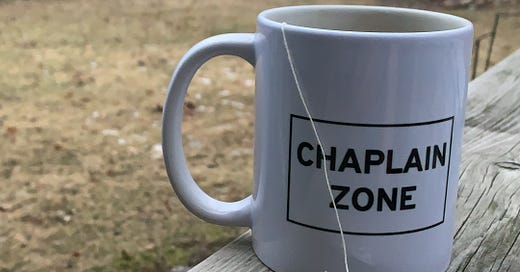006 Being helpful in loss because you are a helper.
Welcome. Or welcome back.
+++
“To be more persuasive, change verbs to nouns.”
It’s not often that I think about grammar. But Daniel Pink and Jonah Berger were talking about how changing two letters can make people more responsive, so I thought about grammar.
And I thought about you.
Berger says that rather than asking people to help, we’re more likely to get help by asking them to be a helper. Two letters move from a request to act, to an appeal to identity.
This is what helpers do. This is what writers do. This is what runners do.
You are reading this newsletter because you are a helper, a friend, a compassionate person. You are reading this because you are a reader.
And I’m grateful for your learning and questions.
+++
“Being with helps”
Recently, I walked with a family through the first hours of awful news. As they trickled into the hospital, they gathered in the ER, then were guided to another lounge, and eventually to a hospital room. As chaplains, most of what we do in those times is logistics, moving people from place to place as their minds gather small bits of data, and their hearts start breaking.
A couple hours in, I looked at a parent and said, “For you, I don’t have any words.”
“I know,” they said. “Being with us helps.”
+++
"Here's what helped me. It will help you, too."
I know that I am contrary. When someone says, "You'll love this book," I'm confident that I will not. When someone says, "Who doesn't love this band /this food/ this movie", I raise my hand.
Maybe it's just me. But I'm guessing that you may resist generalizations, too.
We understand that in many areas of our lives. Vegetables. Music styles. Fitness. Many of us don't understand that in offering grief support.
"Here's what helped me in my loss. I know it will help you."
It comes from a good place. It starts with experiencing deep pain. It moves to considering what did — and didn't — help us. It continues to wanting to identify with the deep pain of someone else.
And then it jumps to our cultural tendency to want to do something. To be helpful. To offer recipes.
I'm convinced, however, that we have differences in our responses to things, including loss.
You were helped by a particular song. You point me to it saying, "This is so helpful." I've never liked that song or style or singer.
You were helped by a saying. You say it to me saying, "This will change your life." I find the logical gaps in it.
When we tell someone they will be helped by what helped us, we may be creating an obligation. If it doesn’t help, then they have a double burden – the grief they already felt, and the burden of letting us down by not being helped.
Here's my suggestion.
Drop the should. Be the shoulder.
(If eventually you want to share steps from your story, Saying “try this” may be more helpful than “do this”)
+++
Responding to a need that loss revealed.
I hear often about people who write books and start organizations because of their experience. Some of them are remarkably tender.
Delany and Marc had an emotional and financial hit after the loss of their daughter. When they were expecting to pay for a nursery, they had to pay for a funeral. They committed to building an organization that has helped 300 families with funeral expenses, giving them an awareness that someone sees and cares for them.
(Here’s a recent story about Remembering Rowan Joy.)
+++
Being helpful in real time.
I’m aware that among the people who read my words are people whose loss is decades past.
While I’m writing today’s newsletter, I’m also hearing from a friend who is attending a funeral visitation tonight for her good friend whose death was expected. And for her friend’s husband whose death was not expected. A double funeral. My friend was with her friend all the way to the end. (If you think about it, talk with God about my friend in her grief.)
We are all and each helpers, working to find words and silences and acts and stillness that will offer support in this moment, and during this lifetime.
I’m cheering and crying and praying and writing for you.
See you next week.
Jon





